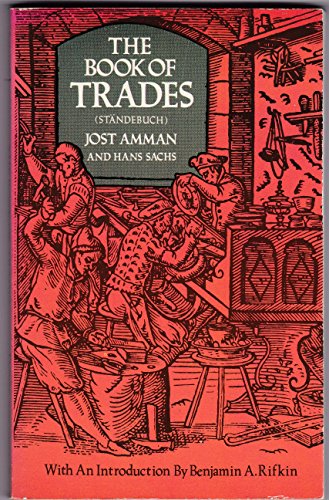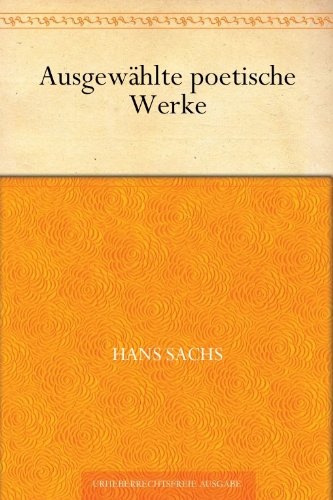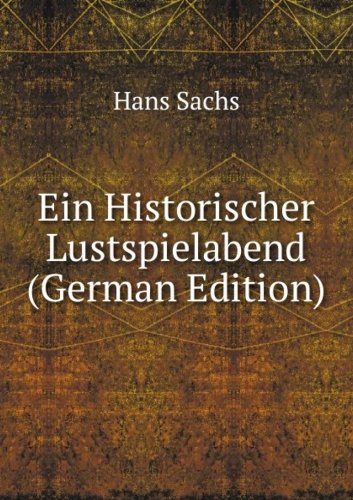Background
Hans Sachs was born on November 5, 1494 in Nuremberg, Germany, the son of a tailor of the upper middle class.



(A 1568 German work uses humorous verse to describe more t...)
A 1568 German work uses humorous verse to describe more than one hundred woodcuts depicting the activities of spiritual and secular craftsmen
http://www.amazon.com/gp/product/048622886X/?tag=2022091-20

(Bei diesem Werk handelt es sich um eine urheberrechtsfrei...)
Bei diesem Werk handelt es sich um eine urheberrechtsfreie Ausgabe. Der Kauf dieser Kindle-Edition beinhaltet die kostenlose, drahtlose Lieferung auf Ihren Kindle oder Ihre Kindle-Apps.
http://www.amazon.com/gp/product/B00507T54K/?tag=2022091-20

(This book, "Ein Historischer Lustspielabend (German Editi...)
This book, "Ein Historischer Lustspielabend (German Edition)", by Hans Sachs, is a replication. It has been restored by human beings, page by page, so that you may enjoy it in a form as close to the original as possible. This book was created using print-on-demand technology. Thank you for supporting classic literature.
http://www.amazon.com/gp/product/5874672737/?tag=2022091-20
Hans Sachs was born on November 5, 1494 in Nuremberg, Germany, the son of a tailor of the upper middle class.
From 1501 Sachs attended the grammar school in Nuremberg. In 1508 he was apprenticed to a shoemaker. As a journeyman, he traveled from one German town to another between 1511 and 1516 learning his trade. Simultaneously, he studied Meistergesang (German art of singing original poems to usually original tunes, according to the rules of the pedestrian craft of burgher poets) in the Singschulen, his principal teacher being Leonhard Nunnenbeck.
In Nuremberg in 1517 Sachs attained the rank of master in the shoemakers' guild and in Meistergesang. He declared himself in favor of Martin Luther in the poem Die wittenbergische Nachtigall ("The Nightingale of Wittenberg") in 1523 and also in prose dialogues. Sachs produced works in profusion: more than 4, 000 Meisterlieder; 208 dramas, according to his own count; 85 Shrovetide plays; and many rhymed orations and other verses. During his lifetime three volumes of his verse appeared, and two more were issued posthumously. Other works remain unpublished in a collection in Zwickau, Saxony.
His themes, derived from his reading in anecdotal and farcical literature of the time and from popularized and trivialized hero lore, covered a wide range from classical (Lucretia), biblical (Cain and Abel), and medieval (Siegfried) times to later periods. No matter what the subject or era, the time and locale were always those of Sachs's own Nuremberg; his characters talked like upright burghers of his age.
Sachs's so-called meistersinger dramas, a genre originating with his predecessor Rosenplüth, were merely dramatized dialogues, weak and heavy in the tragic mood, sprightly in the comic. Sachs excelled in the didactic-satiric manner. His best works were his later, exuberant Shrovetide plays, such as Der fahrende suchüler im Paradies (1550; The Itinerant Scholar in Paradise) and Das heisse Eisen (1551; The Hot Iron), and such narrative skits as St. Peter mit der Geis ( St. Peter with the Goat), all in rhymed doggerels. Sachs's satire was good-natured, his humor never unduly coarse. He had a healthy moral instinct and a realistic bent, best employed on familiar ground.
Sachs’s comedies, performed in taverns and halls, though lacking dramatic quality, had influenced folk drama. Eclipsed after his death, his work was revived and popularized by Johann Wolfgang von Goethe in a poem of 1776; and in the opening scene of Faust, Goethe resuscitated Sachs's free doggerels. Some of Sachs’s plays, such as Der farent Schüler im Paradeis (1550; The Wandering Scholar), are performed today, and renewed interest in Renaissance music has resulted in a revival of his songs.
(A 1568 German work uses humorous verse to describe more t...)
(This book, "Ein Historischer Lustspielabend (German Editi...)
(Bei diesem Werk handelt es sich um eine urheberrechtsfrei...)
(Erster Band - Gedichte de Hans Sachs. , 1960.)
